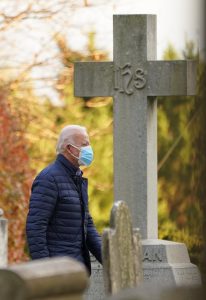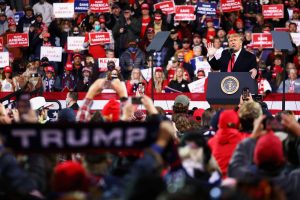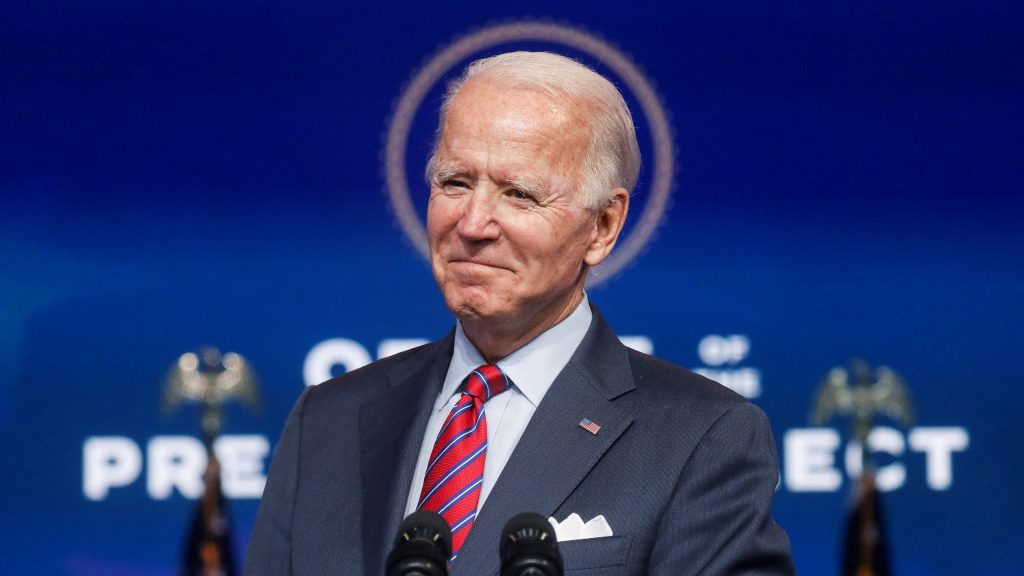Editor's note: This is the third of an eight-part year-end backgrounder series on 2020 by Catholic News Service.
Democrat Joe Biden became the second Catholic elected to lead the country Nov. 3, outpolling Republican incumbent Donald Trump by calling for national unity and cooperation and determination to overcome the coronavirus pandemic.
Garnering more than 81.2 million votes, the most for a presidential candidate in history, Biden was establishing his administration as he prepared to take the oath of office Jan. 20.
The election became all the more historic by the election of Sen. Kamala Harris, D-California, as vice president. She will be the first woman to hold the second-highest position in the federal government.
However, Trump had yet to concede the election Dec. 7 and continued mounting legal challenges to vote counts in several battleground states while casting doubt on the integrity of the country's electoral system.
Democrats, the media and various state officials said Trump's legal team has not produced any direct evidence to support its claims of a rigged election. They disputed a video purporting to show irregularities by election workers in Georgia and questioned claims in hundreds of sworn affidavits gathered by Trump's lawyers from witnesses who said they saw vote counts being altered.
As of Dec. 7, Biden was more than 7 million votes ahead of Trump, who had received almost 74.2 million votes, which also is a record-setting number.
In the all-important Electoral College, the Biden-Harris ticket held a 306-232 lead. Electors will meet Dec. 14 to cast their ballots, confirming the nationwide vote outcome. Congress will meet Jan. 6 to certify the Electoral College results.

Biden follows the late John F. Kennedy, who was elected in 1960, as the only other Catholic to hold the country's highest office.
Archbishop José H. Gomez of Los Angeles, president of the U.S. Conference of Catholic Bishops, congratulated Biden on the victory Nov. 7, hours after news organizations declared that the Democratic candidate had won the race.
The election marked a "time for our leaders to come together in a spirit of national unity," Archbishop Gomez said in a statement. He also called on Biden and Harris to "commit themselves to dialogue and compromise for the common good."
The archbishop celebrated the freedom that allowed Americans to assert their views at the polls. He also said he believed "at this moment in American history, Catholics have a special duty to be peacemakers, to promote fraternity and mutual trust, and to pray for a renewed spirit of true patriotism in our county."
On Nov. 12, Pope Francis called Biden to congratulate him on winning the election. In a readout on the call, the Biden camp said the president-elect thanked the pope for "extending blessings and congratulations and noted his appreciation for His Holiness's leadership in promoting peace, reconciliation and the common bonds of humanity around the world."
Five days later as the USCCB concluded the public portion of its annual fall general assembly, Archbishop Gomez announced the formation of a working group of U.S. bishops to address issues surrounding the election of a Catholic president and policies that may come about that would be in conflict with Catholic teaching and the bishops' priorities.
Archbishop Allen H. Vigneron of Detroit, USCCB vice president, was named to head the working group, which will include conference committee chairmen in a number of areas where disagreement is expected between the church and the future Biden administration.
Archbishop Gomez acknowledged the president-elect "has given us reason to believe his faith commitments will lead to certain policies we favor," such as immigration, aid to refugees and the poor, racial justice, capital punishment and climate change.
He expressed concern, however, that Biden "will support policies that are against some fundamental values we hold dear as Catholics," including "repeal of the Hyde Amendment and his support for Roe v. Wade."
The 1973 Supreme Court Roe v. Wade decision allowed legal abortion throughout the United States. The Hyde Amendment forbids the use of federal funds to be used for abortions, with exceptions in cases of rape or incest or to save the life of the mother.
Archbishop Gomez said support by a Catholic politician for such policies and others that threaten the common good "creates confusion among the faithful about what the church actually teaches on these questions."
A spokesperson for the USCCB told Catholic News Service Dec. 2 that the working group had not yet met.
In the run-up to the election, both campaigns initiated special outreach efforts to Catholic voters. Catholics for Trump and Catholics for Biden worked to mobilize the Catholic vote for each respective candidate.
Polls showed almost an event split among Catholics for Trump and Biden, falling in line with the past three presidential elections.
Data compiled by Associated Press/VoteCast showed that Trump received 50% of the overall Catholic vote to Biden's 49%. Trump won white Catholics by about 15 percentage points.
Edison Research exit polls estimated that about 52% of all Catholic voters chose Biden while 47% preferred Trump.

Both surveys indicate that Biden's Catholic faith did not significantly sway Catholic voters.
Meanwhile, Cardinal Wilton D. Gregory of Washington, who received his red hat at the Vatican Nov. 28, has said he hoped to collaborate with Biden where possible while respectfully pointing out where the president-elect's policies diverge from Catholic teaching.
He also told CNS Nov. 24 he would not prevent the new president, who attends Mass every Sunday, from receiving holy Communion in the archdiocese.
"The kind of relationship that I hope we will have is a conversational relationship where we can discover areas where we can cooperate that reflect the social teachings of the church, knowing full well that there are some areas where we won't agree," Cardinal Gregory said. "They are areas where the church's position is very clear," particularly its opposition to the president-elect's support for legal abortion.
The election year opened with Trump facing impeachment by the Democratic-controlled House of Representatives. House members voted along party lines to impeach Trump Dec. 18, 2019, for abuse of power by enlisting a foreign government to investigate a political rival -- Biden -- ahead of the election and obstruction of Congress' investigation of the matter.
Impeachment hearings ran for 10 days, Jan. 22-31, in the Republican-led Senate. With 67 votes need for a conviction, the Senate Feb. 5 voted 52-48 on the first count and 53-47 on the second count to acquit the president.
Trump celebrated the Senate votes the next morning at the National Prayer Breakfast, walking on stage and displaying newspapers announcing in bold headlines that he had been "Acquitted."
As four members of Congress and a well-known economist called for healing, unity and "love of neighbor" at the 68th annual event attended by more than 3,000 people in Washington, Trump broke ranks and criticized Democrats for impeaching him while he hailed Republicans who acquitted him.
The president accused Democrats, whom he called "very dishonest and corrupt people," of putting his family and the country through "a terrible ordeal" before delivering prepared remarks.
Trump recapped actions his administration had undertaken including steps to support prayer in classrooms, aid persecuted religious minorities such as the Yazidis in Iraq and Christians elsewhere, policies to protect unborn children and the formation of the international Religious Freedom Alliance involving about 25 nations.

